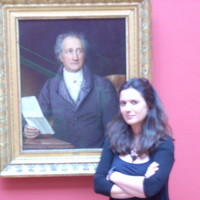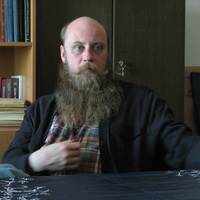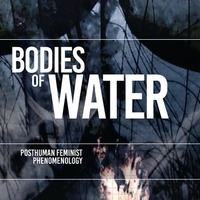Books by Søren Frank

“A Poetic History of the Oceans has compelling qualities: a fascinating topic, incredible eruditi... more “A Poetic History of the Oceans has compelling qualities: a fascinating topic, incredible erudition, an innovative, wide-ranging approach, and a seductive, reader-friendly style. The quality of the scholarship is remarkable, both concerning the works examined and the thinkers and literary critics that are consulted and cited. Given the superb treatment of the topic, the wealth of information, and the theoretical insights, Frank’s book could very well become a classic in its field.”
- Thomas Pavel, Professor of Romance Languages and Comparative Literature, University of Chicago
“Combining a capacious vision of the long history of oceanic narratives in Western culture with incisive analysis of recent scholarship in the ‘blue humanities,’ A Poetic History of the Oceans provides an excellent overview of oceanic literature and culture. At this book’s core lies a brilliant reading of Moby-Dick as model for four distinct historical iterations of Western imaginations of the sea. In reading Melville’s novel as simultaneously theocentric, anthropocentric, technocentric, and geocentric, Frank shows how this American classic opens onto global vistas. Beyond an innovative analysis of the English-language canon, however, this book also brings Scandinavian writers and texts forward into their rightful places as oceanic pioneers. The introduction of figures such as Jens Munk, Jonas Lie, Martin Andersen Nexø, and Siri Ranva Hjelm Jacobsen suggests how much scholars and readers can learn from this book.”
- Steve Mentz, Professor of English, St. John’s University, New York
Edited books by Søren Frank
Steder skaber altid betydning. Hvor, hvordan og med hvilke formål gives der eksempler på i disse ... more Steder skaber altid betydning. Hvor, hvordan og med hvilke formål gives der eksempler på i disse 15 artikler med analyser af en raekke kulturelle udtryksformer. Bidragene tager udgangspunkt i forskellige dele af de seneste cirka 60 års differentierede teoriudvikling inden for human-og samfundsvidenskaberne, der har rettet en vedvarende opmaerksomhed mod såvel konkrete steders formning og funktionssammenhaenge som repraesentationer af steder i blandt andet litteratur, billeder, arkitektur, byudvikling, havekunst, TV og computerspil. Tidsmaessigt straekker antologiens empiriske genstandsfelter sig fra middelalder og renaessance og helt frem til vor tid. Med denne både teoretiske og historiske spaendvidde søger antologien at tage laeseren med på en vandring i det store betydnings-og sansepotentiale, stedet rummer som fysisk manifestation og erkendelseskategori.
Articles by Søren Frank

German Quarterly, 2021
Literary Studies and Entanglements beyond the Nation i have always had an ambivalent relationship... more Literary Studies and Entanglements beyond the Nation i have always had an ambivalent relationship to the job description of scholars employed in "national" literature programs. on the one hand, i envy the expertise of these scholars, their deep and detailed knowledge of a circumscribed body of works and authors, often not only demarcated by linguistic and political-geographical boundaries, but also by historical incisions that have long defined the pedagogical training they offer: German literature 1918-1933; american literature 1837-1861; French literature 1643-1715. the level of expertise may even rise further as scholars focus on one specific author's life and work. on the other hand, i cannot help wondering what drove some scholars to rule out "the world" and opt for "the nation." Does being an expert in, say, thomas Mann or his Buddenbrooks not automatically lead one to alexander kielland's Garman & Worse, from lübeck and Germany to Stavanger and Norway? in Salman rushdie or his Midnight' s Children to Günter Grass and The Tin Drum, from Mumbai, india and england to Danzig, Germany and Poland? or in Felicitas hoppe-for example hoppe or some of her children's books-to hans Christian andersen's autofictional works or fairy tales, from Germany to Denmark? My own experiences with libraries may illustrate an important point here. in spite of the archive's heterogeneity and endlessness, there has always been a certain target-oriented ethos determining my behavior in research libraries. i am usually searching for something very specific. however, my behavior in public libraries is different. there i am more open to contingencies and spontaneous inspiration. When i was young, i remember how fascinated and absorbed i was in front of the shelves with translated literature from (almost) all over the world. today, i realize the importance of these shelves for "bibliomigrancy" and its constitutive role in the creation of a specific version of world literature (Mani, Recoding World literature). Seen from my current scholarly and institutional perspective, all those translations loosened the strict ties between literature and language that define or at least dominate national literature departments. they facilitated contacts. here, on these bookshelves, Margaret atwood was a neighbor to Miguel Ángel asturias. a little further away but still in the area, Chinua achebe and edward albee lived on the same street. Simone de Beauvoir and Samuel Beckett were on the same shelf as aphra Behn, Gottfried Benn, and Victoria Benedictsson. Why would i not want to read all of them? Similar to what Domínguez, Saussy, and Villanueva claim about comparative literature, a bookshelf with translated fiction in a public library "endorses some of the intuitions we have as common readers," for example that reading has an element of "just for fun" (ix), but not least that it has a freedom to it, which is not restricted by any one geography and language. the expertise and sharp historical incisions that national literary specializations invoke run the risk of insulation. admittedly, the discipline of comparative literature has its own pitfalls. the comparative method may take the form of groundless analogies, or its worldly ambition may lead to dilettantism. But the principle of not ruling anything out, of letting the world in, is a risk worth taking. Franco Moretti has argued that whether it is studied by a nationalist or a comparatist, the literature is the same. the two methods, however, see something different: trees and waves. it is generally acknowledged that for comparative literature to emerge (around 1810), there first had to exist national literatures and, not least, a firm idea of what characterized each of those. if not, there would not have been anything to compare. But

Norsk litteraturvitenskapeligt tidsskrift, 2021
Gennem en virtuos iscenesættelse af forskellige skalaer genfortolker Siri Ranva Hjelm Jacobsens H... more Gennem en virtuos iscenesættelse af forskellige skalaer genfortolker Siri Ranva Hjelm Jacobsens Havbrevene forholdet mellem menneske og natur i det antropocæne. Et oceanisk perspektiv på planetens og menneskenes historie supplerer ikke kun den grønne økologis harmoni med blåt kaos og voldsomhed, det transcenderer et antropocentrisk perspektivs tidslige, rumlige og artsmæssige bundethed. Gennem den antropomorfe brevform sikres dog en menneskelig forbundethed. Brevene suppleres af illustrationer og seks diskursivt forskellige referencer til Ikarosmyten, der gennem yderligere skalaforskydninger skaber en polyfoni af perspektiver på menneskets rolle i planetens historie. Én reference er Bruegels Landskab med Ikaros’ fald, omkring hvilket der har udviklet sig et genuint ekkokammer, som betoner Ikaros’ centralitet. Havbrevene forstyrrer dette ekkokammer med sin geocentriske profeti om en blå planet. Foruden en analytisk beskaffenhed diskuterer artiklen også blå humaniora og en såkaldt amfibisk litteraturvidenskab som nødvendige metoder i en tiltagende ustabil og våd verden.

Rhythms Now: Henri Lefebvre's Rhythmanalysis Revisited, 2019
In popular imagination, especially during the period spanning from the oceanic turn around 1500 u... more In popular imagination, especially during the period spanning from the oceanic turn around 1500 until the first half of the 20 th century, ship life was shrouded in romantic ideas of unlimited freedom, unbounded movement, and unconditional escape, but also in more realist notions such as hard work, brutal violence, and claustrophobic space. 2 The sea for its part was (and still is) admired and feared at one and the same time for its formless sublimity, chaotic rage, and mysterious depths. It is as if ship and sea are empty containers into which we can pour whatever liquid content we want. They are endowed with hyper-metaphorical potential and as such they can signify this and that, kiss and cat, but also these and those, bees and nose. Examples? Well, in "Genesis" the ocean is initially associated with primeval chaos and later, when materialized as the flood,
Literature: An Introduction to Theory and Analysis, 2017
Nordic Literature: A comparative history, 2017
The essay does not provide a final answer to the question of its subtitle, but it juxtaposes the ... more The essay does not provide a final answer to the question of its subtitle, but it juxtaposes the profiles of Michael Laudrup and Zlatan Ibrahimović in terms of soccer abilities, career statistics and social backgrounds. While arguing that comparisons between soccer players are in principle meaningless, the essay nevertheless employs comparison heuristically in order to outline each player’s uniqueness through differences and similarities. If Laudrup and Ibrahimović are considered to be the best ever soccer players of Scandinavia, sharing traits of technical brilliance and postmodern nomadism, they are also conspicuously contrasting characters and players, partly as a result of their different backgrounds. Common for both of them, though, is their symbolic value in the contexts of their social and national backgrounds.











Uploads
Books by Søren Frank
- Thomas Pavel, Professor of Romance Languages and Comparative Literature, University of Chicago
“Combining a capacious vision of the long history of oceanic narratives in Western culture with incisive analysis of recent scholarship in the ‘blue humanities,’ A Poetic History of the Oceans provides an excellent overview of oceanic literature and culture. At this book’s core lies a brilliant reading of Moby-Dick as model for four distinct historical iterations of Western imaginations of the sea. In reading Melville’s novel as simultaneously theocentric, anthropocentric, technocentric, and geocentric, Frank shows how this American classic opens onto global vistas. Beyond an innovative analysis of the English-language canon, however, this book also brings Scandinavian writers and texts forward into their rightful places as oceanic pioneers. The introduction of figures such as Jens Munk, Jonas Lie, Martin Andersen Nexø, and Siri Ranva Hjelm Jacobsen suggests how much scholars and readers can learn from this book.”
- Steve Mentz, Professor of English, St. John’s University, New York
Edited books by Søren Frank
Articles by Søren Frank
- Thomas Pavel, Professor of Romance Languages and Comparative Literature, University of Chicago
“Combining a capacious vision of the long history of oceanic narratives in Western culture with incisive analysis of recent scholarship in the ‘blue humanities,’ A Poetic History of the Oceans provides an excellent overview of oceanic literature and culture. At this book’s core lies a brilliant reading of Moby-Dick as model for four distinct historical iterations of Western imaginations of the sea. In reading Melville’s novel as simultaneously theocentric, anthropocentric, technocentric, and geocentric, Frank shows how this American classic opens onto global vistas. Beyond an innovative analysis of the English-language canon, however, this book also brings Scandinavian writers and texts forward into their rightful places as oceanic pioneers. The introduction of figures such as Jens Munk, Jonas Lie, Martin Andersen Nexø, and Siri Ranva Hjelm Jacobsen suggests how much scholars and readers can learn from this book.”
- Steve Mentz, Professor of English, St. John’s University, New York